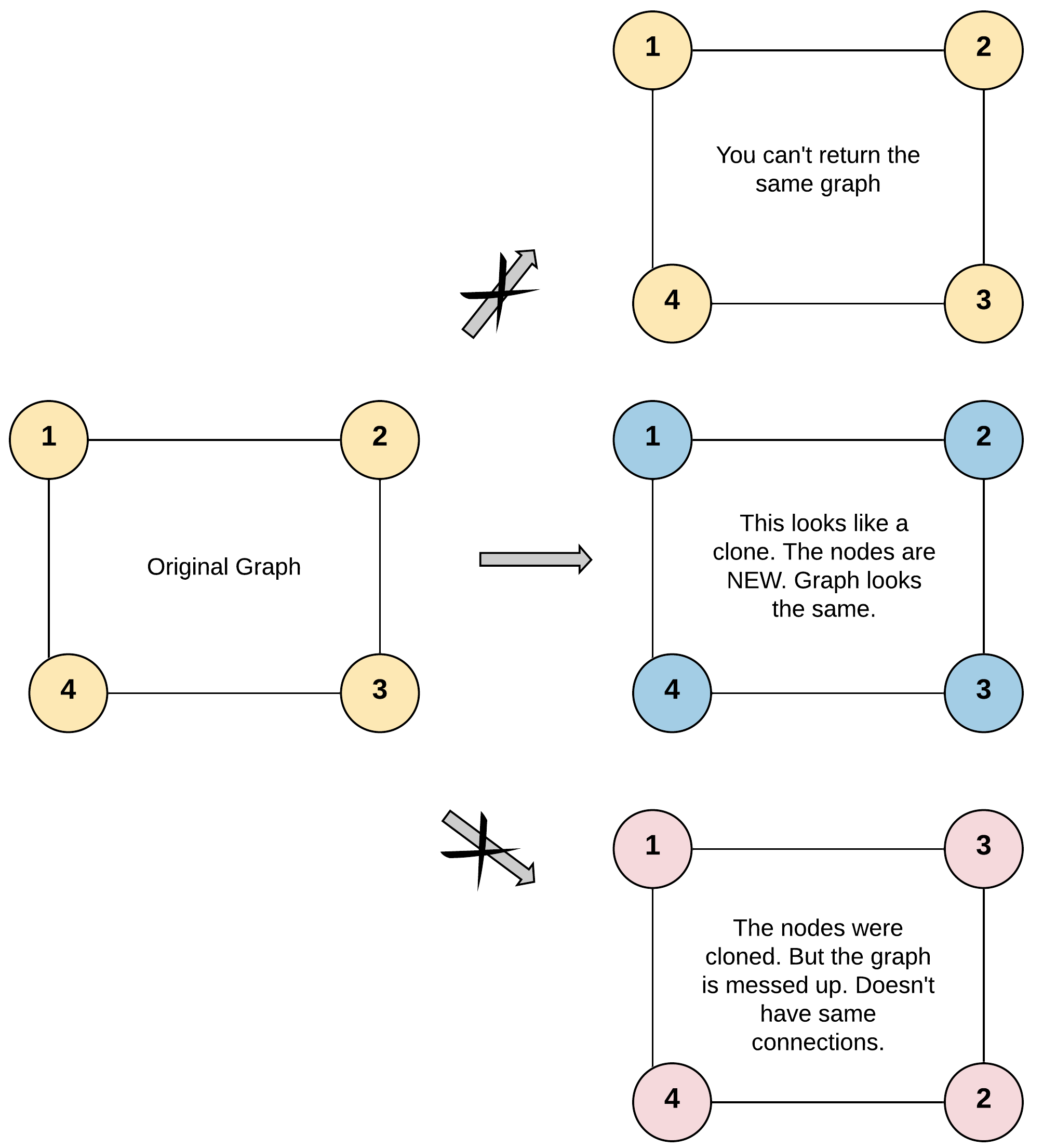Welcome to Subscribe On Youtube
133. Clone Graph
Description
Given a reference of a node in a connected undirected graph.
Return a deep copy (clone) of the graph.
Each node in the graph contains a value (int) and a list (List[Node]) of its neighbors.
class Node {
public int val;
public List<Node> neighbors;
}
Test case format:
For simplicity, each node's value is the same as the node's index (1-indexed). For example, the first node with val == 1, the second node with val == 2, and so on. The graph is represented in the test case using an adjacency list.
An adjacency list is a collection of unordered lists used to represent a finite graph. Each list describes the set of neighbors of a node in the graph.
The given node will always be the first node with val = 1. You must return the copy of the given node as a reference to the cloned graph.
Example 1:

Input: adjList = [[2,4],[1,3],[2,4],[1,3]] Output: [[2,4],[1,3],[2,4],[1,3]] Explanation: There are 4 nodes in the graph. 1st node (val = 1)'s neighbors are 2nd node (val = 2) and 4th node (val = 4). 2nd node (val = 2)'s neighbors are 1st node (val = 1) and 3rd node (val = 3). 3rd node (val = 3)'s neighbors are 2nd node (val = 2) and 4th node (val = 4). 4th node (val = 4)'s neighbors are 1st node (val = 1) and 3rd node (val = 3).
Example 2:

Input: adjList = [[]] Output: [[]] Explanation: Note that the input contains one empty list. The graph consists of only one node with val = 1 and it does not have any neighbors.
Example 3:
Input: adjList = [] Output: [] Explanation: This an empty graph, it does not have any nodes.
Constraints:
- The number of nodes in the graph is in the range
[0, 100]. 1 <= Node.val <= 100Node.valis unique for each node.- There are no repeated edges and no self-loops in the graph.
- The Graph is connected and all nodes can be visited starting from the given node.
Solutions
-
/* // Definition for a Node. class Node { public int val; public List<Node> neighbors; public Node() { val = 0; neighbors = new ArrayList<Node>(); } public Node(int _val) { val = _val; neighbors = new ArrayList<Node>(); } public Node(int _val, ArrayList<Node> _neighbors) { val = _val; neighbors = _neighbors; } } */ class Solution { private Map<Node, Node> visited = new HashMap<>(); public Node cloneGraph(Node node) { if (node == null) { return null; } if (visited.containsKey(node)) { return visited.get(node); } Node clone = new Node(node.val); visited.put(node, clone); for (Node e : node.neighbors) { clone.neighbors.add(cloneGraph(e)); } return clone; } } -
/* // Definition for a Node. class Node { public: int val; vector<Node*> neighbors; Node() { val = 0; neighbors = vector<Node*>(); } Node(int _val) { val = _val; neighbors = vector<Node*>(); } Node(int _val, vector<Node*> _neighbors) { val = _val; neighbors = _neighbors; } }; */ class Solution { public: unordered_map<Node*, Node*> visited; Node* cloneGraph(Node* node) { if (!node) return nullptr; if (visited.count(node)) return visited[node]; Node* clone = new Node(node->val); visited[node] = clone; for (auto& e : node->neighbors) clone->neighbors.push_back(cloneGraph(e)); return clone; } }; -
""" # Definition for a Node. class Node: def __init__(self, val = 0, neighbors = None): self.val = val self.neighbors = neighbors if neighbors is not None else [] """ class Solution: def cloneGraph(self, node: 'Node') -> 'Node': visited = defaultdict() def clone(node): if node is None: return None if node in visited: return visited[node] c = Node(node.val) visited[node] = c for e in node.neighbors: c.neighbors.append(clone(e)) return c return clone(node) -
/** * Definition for a Node. * type Node struct { * Val int * Neighbors []*Node * } */ func cloneGraph(node *Node) *Node { visited := map[*Node]*Node{} var clone func(node *Node) *Node clone = func(node *Node) *Node { if node == nil { return nil } if _, ok := visited[node]; ok { return visited[node] } c := &Node{node.Val, []*Node{} } visited[node] = c for _, e := range node.Neighbors { c.Neighbors = append(c.Neighbors, clone(e)) } return c } return clone(node) } -
/** * Definition for Node. * class Node { * val: number * neighbors: Node[] * constructor(val?: number, neighbors?: Node[]) { * this.val = (val===undefined ? 0 : val) * this.neighbors = (neighbors===undefined ? [] : neighbors) * } * } */ function cloneGraph(node: Node | null): Node | null { if (node == null) return null; const visited = new Map(); visited.set(node, new Node(node.val)); const queue = [node]; while (queue.length) { const cur = queue.shift(); for (let neighbor of cur.neighbors || []) { if (!visited.has(neighbor)) { queue.push(neighbor); const newNeighbor = new Node(neighbor.val, []); visited.set(neighbor, newNeighbor); } const newNode = visited.get(cur); newNode.neighbors.push(visited.get(neighbor)); } } return visited.get(node); } -
using System.Collections.Generic; public class Solution { public Node CloneGraph(Node node) { if (node == null) return null; var dict = new Dictionary<int, Node>(); var queue = new Queue<Node>(); queue.Enqueue(CloneVal(node)); dict.Add(node.val, queue.Peek()); while (queue.Count > 0) { var current = queue.Dequeue(); var newNeighbors = new List<Node>(current.neighbors.Count); foreach (var oldNeighbor in current.neighbors) { Node newNeighbor; if (!dict.TryGetValue(oldNeighbor.val, out newNeighbor)) { newNeighbor = CloneVal(oldNeighbor); queue.Enqueue(newNeighbor); dict.Add(newNeighbor.val, newNeighbor); } newNeighbors.Add(newNeighbor); } current.neighbors = newNeighbors; } return dict[node.val]; } private Node CloneVal(Node node) { return new Node(node.val, new List<Node>(node.neighbors)); } } -
/** * // Definition for a _Node. * function _Node(val, neighbors) { * this.val = val === undefined ? 0 : val; * this.neighbors = neighbors === undefined ? [] : neighbors; * }; */ /** * @param {_Node} node * @return {_Node} */ var cloneGraph = function (node) { const g = new Map(); const dfs = node => { if (!node) { return null; } if (g.has(node)) { return g.get(node); } const cloned = new _Node(node.val); g.set(node, cloned); for (const nxt of node.neighbors) { cloned.neighbors.push(dfs(nxt)); } return cloned; }; return dfs(node); };